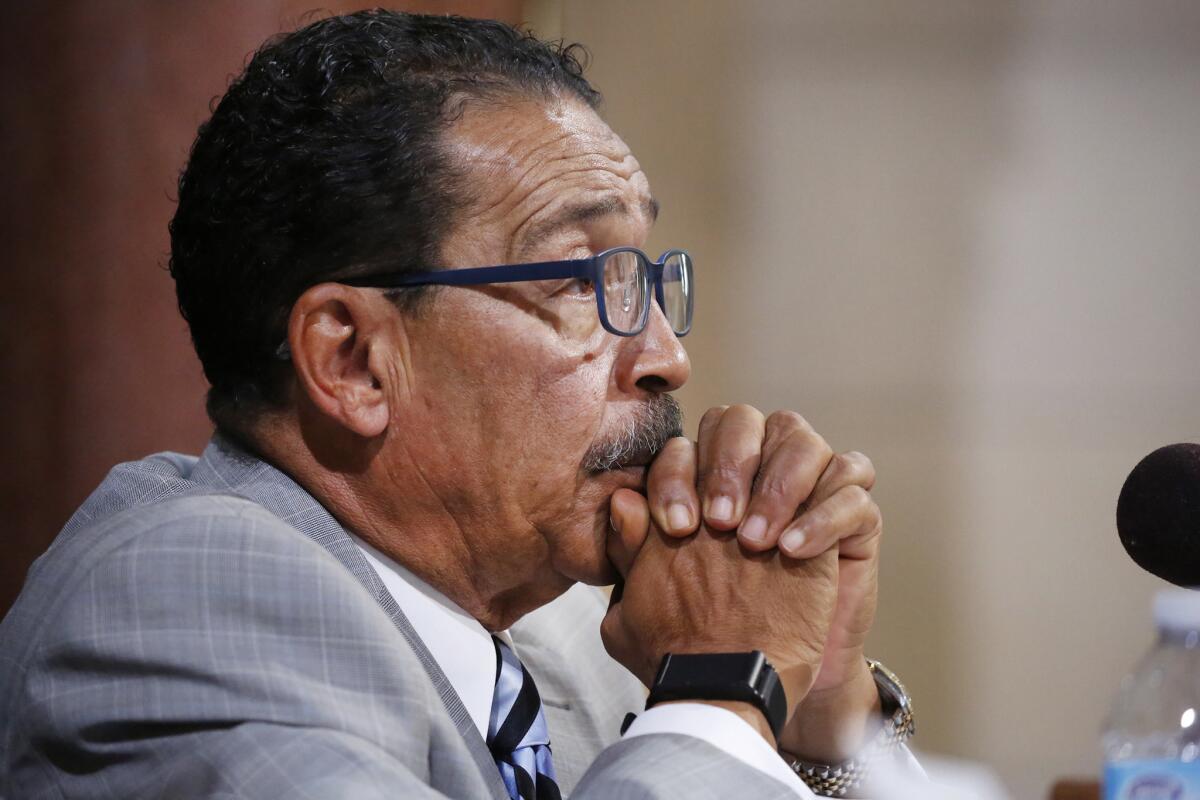Union-backed changes to LAPD disciplinary system could go to voters

- Share via
Los Angeles city leaders took the first step Wednesday toward a major overhaul of the Police Department’s disciplinary process — a move long sought by the union that represents rank-and-file officers.
City Council President Herb Wesson unveiled plans for a May ballot measure that would allow the LAPD’s Board of Rights panels, which review serious misconduct cases, to be made up entirely of civilians.
The three-member boards are currently made up of two officers, both at the rank of captain or above, and one civilian. Under Wesson’s proposal, officers facing a disciplinary hearing would have the option of asking for their cases to be heard by a civilian-only panel.
Those changes, if approved by voters, would hand a major victory to the Los Angeles Police Protective League, which represents about 9,800 officers and has been at odds with Police Chief Charlie Beck over discipline. The union filed a federal lawsuit against the city in May, calling for more civilian representation in the disciplinary system and accusing Beck of having a “corrupting influence” over misconduct cases.
Beck, in turn, has publicly questioned the union’s motives, arguing that civilians are known to be more lenient toward police officers accused of misconduct.
A Board of Rights has the power to administer major penalties, including lengthy suspensions and terminations. Wesson dismissed the idea that the ballot proposal would represent a rebuke of Beck on disciplinary matters. Civilian oversight, he said, “just works for us here in L.A.”
“I do not see anything negative about more citizen, or civilian, participation,” Wesson said. “I don’t anticipate that this will loosen or reduce discipline. I think this will be a fair process, where you’ll have a civilian group of folk that are engaged.”
Mayor Eric Garcetti said he supports the ballot proposal and has been working with both Wesson and the union to create a “fair, transparent, accountable” personnel process at the LAPD. The proposed changes, which would require an amendment to the City Charter, would last at a minimum of three years, a time period that encompasses the remainder of Beck’s final five-year term.
Craig Lally, president of the police union, said Wesson’s proposal would represent the biggest change to the LAPD’s disciplinary process in 50 years.
He said the measure’s three-year threshold has “absolutely nothing” to do with the police chief and instead was a “fair period of time” to assess whether a modified disciplinary system would work. “Who’s to say the chief is going to stay three years?” he said.
Lally said officers have long worried that the existing disciplinary boards could be unfairly influenced by favoritism within the LAPD — or by the chief’s influence on the high-ranking officers who sit on those panels. Having the option of an all-civilian panel, he said, would assure officers that their cases could be judged on the evidence alone.
“I’m sure the chief will be upset about this … but also I think that he’s going to recognize that it’s all about fairness and the perception of officers getting a fair shake,” Lally said.
In a statement, LAPD spokesman Josh Rubenstein said department officials are committed to improving the disciplinary system and working with both the union and City Council “to make meaningful and effective reforms.”
“We look forward to discussing the various options with the City Council so that any ballot measure to amend the City’s Charter regarding the disciplinary system, such as requiring only civilian hearing officers, does not compromise the chief or the department’s ability to hold an officer accountable for misconduct — an essential element of maintaining the public’s trust,” the statement read.
Under the current system, the police chief must send officers facing serious discipline to a Board of Rights. If the panel determines the officer is guilty of the accusations, it then assigns a penalty. The chief can either accept or reduce that penalty, but not increase its severity.
Connie Rice, a longtime civil rights attorney who has partnered with the LAPD on community policing strategies, questioned whether the proposed all-civilian panels would have the expertise or training necessary to properly evaluate the cases.
“I wouldn’t automatically assume that civilian oversight is going to end up giving more accountability,” she said.
John Mack, who served on the Board of Police Commissioners for eight years, voiced similar skepticism, saying he doubts the proposal would improve disciplinary reviews at the LAPD.
“There’s a tendency sometimes for civilians to go overboard in giving officers the benefit of the doubt in cases of categorical use of force, or [officer-involved shootings], even when the facts and the evidence demonstrate otherwise,” he said.
The police union frequently puts its financial might behind its chosen candidates; in 2013, the league spent more than $1.5 million to support Wendy Greuel, who was defeated by Garcetti. Wesson’s proposal was unveiled four months before the March election, which will feature contests for mayor, city attorney, city controller and eight council seats.
A Wesson aide said the LAPD proposal was also signed by Councilman Joe Buscaino, a former police officer, and Councilman Curren Price, who represents part of South Los Angeles. The measure will be evaluated by a committee headed by Wesson, with a vote expected by mid-January.
Twitter: @DavidZahniser
ALSO
With hate crimes rising, L.A. law enforcement vows to crack down
El Centro police investigating after video shows officers hitting suspect
San Diego police unveil gunshot-detection system
More to Read
Sign up for Essential California
The most important California stories and recommendations in your inbox every morning.
You may occasionally receive promotional content from the Los Angeles Times.











